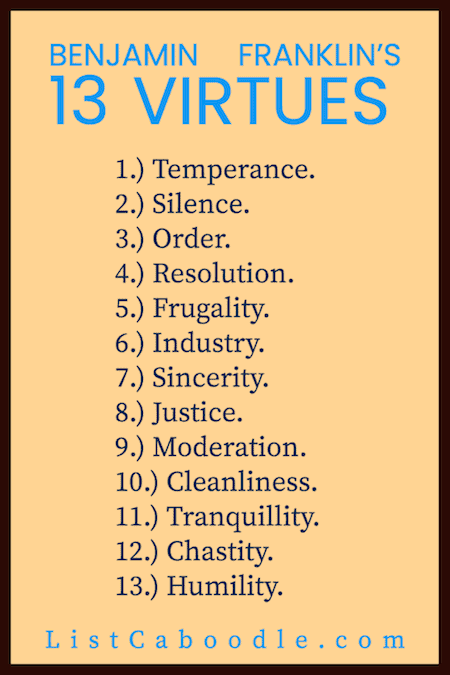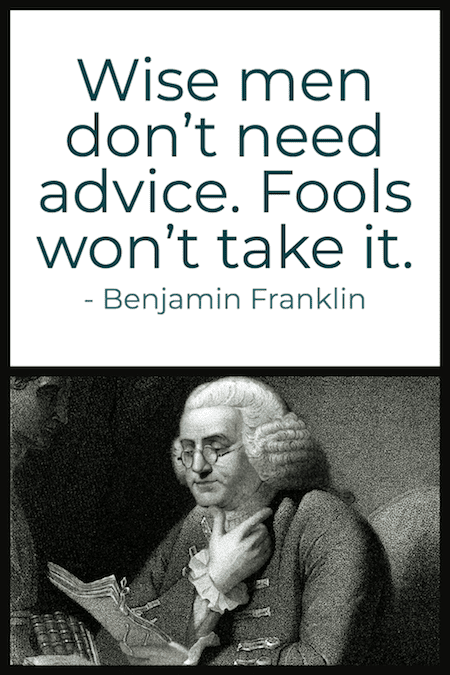Benjamin Franklin’s List of 13 Virtues
At the tender age of 20, Benjamin Franklin wrote down a system to develop his character. Benjamin Franklin’s List of 13 Virtues was listed in The Autobiography of Benjamin Franklin.
Franklin’s quest to be a better person led to a set of rules: “It was about this time I conceived the bold and arduous project of arriving at moral perfection. I wished to live without committing any fault at any time; I would conquer all that either natural inclination, custom, or company might lead me into.”
Franklin noted that these virtues “occurr’d to me as necessary or desirable.”

Franklin’s 13 Virtues
1.) Temperance. Eat not to dullness; drink not to elevation.
2.) Silence. Speak not but what may benefit others or yourself; avoid trifling conversation.
3.) Order. Let all your things have their places; let each part of your business have its time.
4.) Resolution. Resolve to perform what you ought; perform without fail what you resolve.
5.) Frugality. Make no expense but to do good to others or yourself, i.e., waste nothing.
6.) Industry. Lose no time; be always employ’d in something useful; cut off all unnecessary actions.
7.) Sincerity. Use no hurtful deceit; think innocently and justly, and, if you speak, speak accordingly.
8.) Justice. Wrong none by doing injuries or omitting the benefits that are your duty.
9.) Moderation. Avoid extremes; forbear resenting injuries so much as you think they deserve.
10.) Cleanliness. Tolerate no uncleanliness in body, cloaths, or habitation.
11.) Tranquillity. Be not disturbed at trifles or at accidents common or unavoidable.
12.) Chastity. Rarely use venery but for health or offspring, never to dullness, weakness, or the injury of your own or another’s peace or reputation.
13.) Humility. Imitate Jesus and Socrates.

How to Acquire These 13 Virtues
Franklin provided a framework for how to work on how to acquire this list of 13 virtues.
He notes,
“My intention being to acquire the habitude of all these virtues, I judg’d it would be well not to distract my attention by attempting the whole at once, but to fix it on one of them at a time; and, when I should be master of that, then to proceed to another, and so on, till I should have gone thro’ the thirteen; and, as the previous acquisition of some might facilitate the acquisition of certain others, I arrang’d them with that view, as they stand above.
Temperance first, as it tends to procure that coolness and clearness of head, which is so necessary where constant vigilance was to be kept up, and guard maintained against the unremitting attraction of ancient habits, and the force of perpetual temptations. This being acquir’d and establish’d,
Silence would be more easy, and my desire being to gain knowledge at the same time that I improv’d in virtue, and considering that in conversation it was obtain’d rather by the use of the ears than of the tongue, and therefore wishing to break a habit I was getting into of prattling, punning, and joking, which only made me acceptable to trifling company, I gave Silence the second place.”
Tracking Progress
As noted above, Franklin focused on one virtue per week. He ran through the 13 virtues in 13 weeks, one virtue per week – and restarted the cycle. He completed the routine four times yearly (13 weeks times four equals 52 weeks).
Franklin tracked his progress in a notebook where he charted his success or failure for each day in a grid form.
His singular focus, tracking success, and repetition have become standards in self-improvement books of all kinds.
Franklin never quite achieved perfection, but he believed his methodology made him a better person.
Per Franklin, “Tho’ I never arrived at the perfection I had been so ambitious of obtaining, but fell far short of it, yet I was, by the endeavor, a better and a happier man than I otherwise should have been if I had not attempted it.”
How the Great Benjamin Franklin Became Great Video
Benjamin Franklin Sayings
Guests, like fish, begin to smell after three days.
He that lieth down with dogs will rise up with fleas.
Beware of little expenses. A small leak will sink a great ship.
Creditors have better memories than debtors.
He does not possess wealth; it possesses him.
Early to bed and early to rise make a man healthy, wealthy, and wise.
Love, a cough, and smoke can’t well be hidden.
Anger is never without a reason but seldom a good one.
Wise men don’t need advice. Fools won’t take it.
See 7 YouTube Videos That Can Save You $500.

Poor Richard’s Almanack Quotes
Love your neighbor, but don’t pull down your hedge.
Never confuse motion with action.
Keep your mouth wet and feet dry.
Eat to live, and not live to eat.
God heals, and the doctor takes the fee.
Any fool can criticize, condemn, and complain, and most fools do.
When in doubt, don’t.
An investment in knowledge pays the best interest.
Final Thoughts
Perhaps, Benjamin Franklin’s approach to leading a virtuous life will give you some ideas on bringing more happiness to you in your life. Franklin was a towering figure in U.S. history. There is lots we can learn from him.
By Mike O’Halloran
Mike is a writer and co-founder of ListCaboodle.
Encore
You are on our Benjamin Franklin’s List of 13 Virtues page.
You might like: